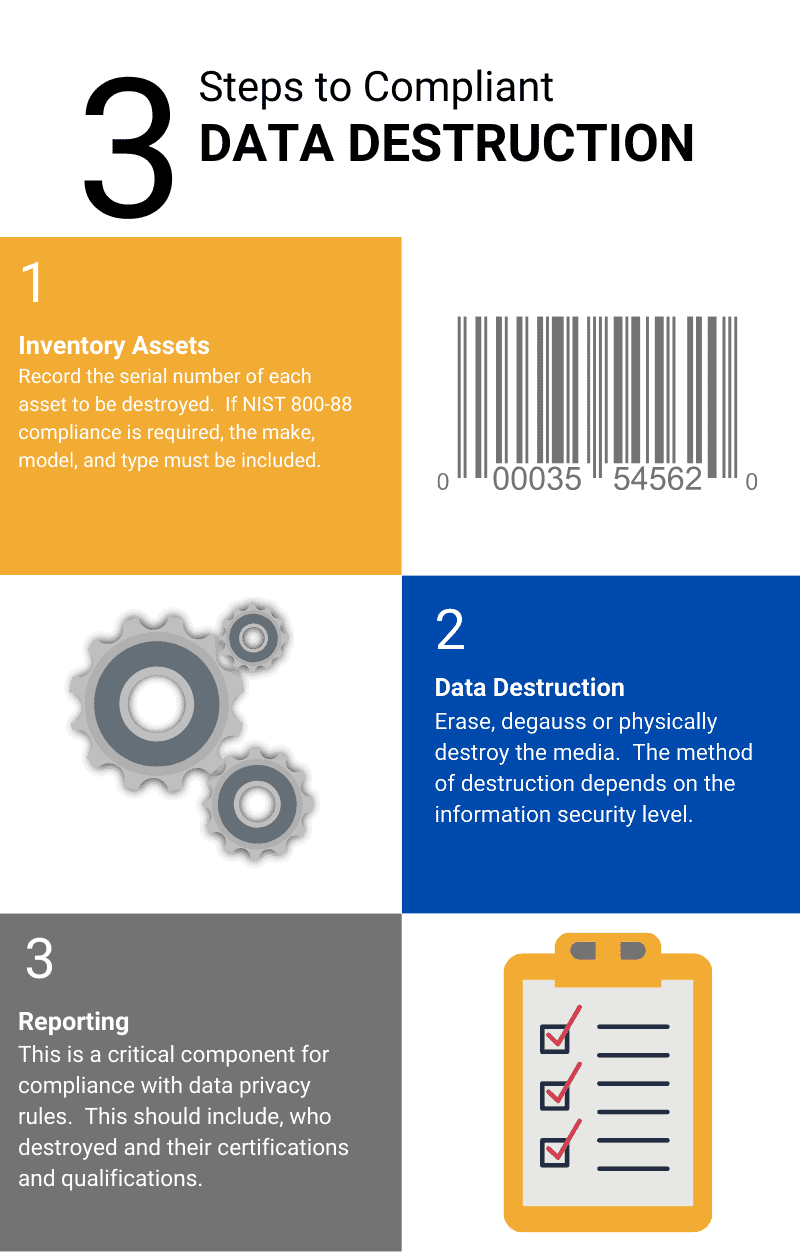Important Cyber Security Practices for Effective Data Destruction Strategies
Important Cyber Security Practices for Effective Data Destruction Strategies
Blog Article
The Necessary Nature of Information Destruction in Upholding Computer System Protection Services and Protecting Against Unauthorized Access
In an age where information breaches and identification burglary are increasingly widespread, the value of effective information damage can not be overstated. Organizations should acknowledge that the failure to appropriately dispose of sensitive info postures not only lawful and financial threats yet also a possible erosion of customer trust. Different techniques, from information cleaning to physical devastation, work as crucial safeguards versus unauthorized access. Comprehending the ramifications of information damage methods and compliance with guidelines elevates necessary questions about the adequacy of current approaches and their lasting stability in the face of advancing dangers.
Importance of Data Devastation
In a significantly digital world, the significance of information devastation can not be overemphasized. As companies amass large quantities of delicate details, the prospective repercussions of failing to properly get rid of and take care of of that data come to be significantly severe. Data breaches, identity theft, and business reconnaissance position significant risks, highlighting the need of reliable data destruction practices.

Additionally, as modern technology develops, so as well do the techniques whereby malicious stars seek to make use of sensitive info. Organizations must remain cautious and positive in their data devastation approaches to secure against these progressing threats. By prioritizing information devastation, business not only safeguard their assets but likewise foster trust among customers and stakeholders, showing a dedication to liable data management and protection methods.
Techniques of Effective Data Destruction
To make certain the total and irreparable damage of delicate information, organizations can utilize a variety of effective methods customized to their particular demands. Among the most common techniques is information wiping, which includes utilizing specialized software application to overwrite existing information several times, making healing essentially impossible. This is specifically valuable for solid-state drives and hard drives, where standard removal techniques are inadequate.
One more efficient technique is degaussing, which utilizes strong magnetic areas to interfere with the magnetic domain names on storage media, providing the data irretrievable. This approach is specifically suited for magnetic storage gadgets, such as tape drives and hard drives.
Physical devastation is additionally a sensible alternative, involving the shredding, crushing, or incineration of storage space tools. This approach assurances that data can not be recovered, making it optimal for organizations handling highly delicate information.

Conformity With Information Protection Regulations
Organizations need to not just focus on effective information destruction methods but also ensure conformity with information security guidelines that control exactly how delicate details news is managed and dealt with. Abiding by these laws is important for maintaining and guarding personal data consumer count on. Rules such as the General Data Protection Guideline (GDPR) in the European Union and the Medical Insurance Portability and Liability Act (HIPAA) in the USA impose stringent guidelines on information administration, which include needs for the safe and secure disposal of sensitive details.
To attain compliance, companies must implement detailed information damage policies that align with these lawful structures. This includes determining information that requires devastation, establishing methods for safe methodsâEUR" such as shredding physical media or making use of software application that satisfies sector criteria for information wipingâEUR" and keeping detailed records of destruction activities. Normal audits needs to be carried out to ensure adherence to these plans and to recognize any type of potential locations for enhancement.
Failing to follow information security regulations can cause significant legal ramifications, consisting of significant fines and damages to an organization's online reputation. Incorporating conformity into information devastation techniques is not just a lawful responsibility yet additionally a vital element of a robust info protection technique.
Repercussions of Poor Information Handling
Poor data handling can anonymous cause serious effects that prolong beyond immediate functional obstacles. Organizations may face substantial financial losses as a result of data violations, which frequently lead to costly remediation initiatives, legal charges, and regulative fines. These economic effects can stress sources and impede growth, inevitably influencing an organization's profits.
Furthermore, inadequate information handling can severely damage a company's reputation. Stakeholders, partners, and clients may shed count on an entity that fails to safeguard sensitive details, leading to reduced consumer commitment and possible loss of business opportunities. This disintegration of trust can take years to restore, if it can be brought back in any way.
Additionally, organizations could encounter lawful ramifications developing from non-compliance with data defense regulations. Such offenses may result in investigations and charges, intensifying the financial problem and additional tainting the company's image.
In the realm of cybersecurity, insufficient data management methods can create susceptabilities that make systems much more susceptible to unauthorized accessibility and cyberattacks. Eventually, these effects highlight the critical value of implementing robust data handling treatments to guard delicate details and keep business integrity.
Finest Practices for Secure Data Disposal


First of all, data should be categorized according to its sensitivity. Sensitive information calls for more extensive disposal methods, such as shredding physical records and utilizing innovative software for digital data cleaning. Using licensed information devastation solutions ensures compliance with industry regulations and requirements.
Second of all, organizations must execute an information disposal policy that mandates routine audits. This policy ought to lay out the procedures for information retention and devastation, guaranteeing that obsolete information is taken care of you could try this out immediately and firmly. Educating workers on these procedures is necessary to promoting a culture of protection recognition.
Finally, maintaining detailed records of disposed information boosts accountability and gives a clear audit route. This documentation needs to consist of the kind of information ruined, the technique used, and the day of disposal.
Verdict
Taking on durable techniques such as information wiping, degaussing, and physical destruction, along with conformity with regulations like GDPR and HIPAA, is important for protecting sensitive details. Disregarding correct data disposal practices can lead to extreme consequences, including data violations and legal effects.
In an age where information violations and identity theft are progressively common, the value of effective information damage can not be overemphasized. data destruction. Data violations, identification burglary, and company reconnaissance present substantial hazards, emphasizing the need of effective data damage techniques
Conformity with regulations such as GDPR and HIPAA requireds that companies implement stringent information security procedures, including the safe and secure devastation of information at the end of its lifecycle.
By focusing on information damage, companies not just shield their assets yet also foster count on amongst stakeholders and customers, demonstrating a dedication to accountable data management and security practices.
Organizations should not just focus on reliable information devastation techniques yet also ensure conformity with data protection policies that regulate just how delicate details is dealt with and disposed of.
Report this page